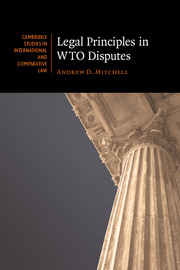Book contents
- Frontmatter
- Contents
- Table of WTO agreements
- Table of WTO cases
- Table of general abbreviations
- Table of WTO award and report abbreviations
- Foreword
- Acknowledgements
- 1 Introduction
- Part I A framework for principles
- 2 Principles of particular relevance to the WTO
- 3 Legal basis for using principles in WTO disputes
- Part II Selected principles examined
- 8 Conclusion
- Bibliography
- Index
2 - Principles of particular relevance to the WTO
Published online by Cambridge University Press: 27 February 2010
- Frontmatter
- Contents
- Table of WTO agreements
- Table of WTO cases
- Table of general abbreviations
- Table of WTO award and report abbreviations
- Foreword
- Acknowledgements
- 1 Introduction
- Part I A framework for principles
- 2 Principles of particular relevance to the WTO
- 3 Legal basis for using principles in WTO disputes
- Part II Selected principles examined
- 8 Conclusion
- Bibliography
- Index
Summary
It has sometimes been complained that the decisions of the World Court have been unpredictable. But the outcome of any case worth litigating must be to a serious degree unpredictable. The problem lies deeper and is more serious than that: it is that the choice of legal principles to be applied and upon which the decision will be made is itself often unpredictable …
Introduction
A common feature of legal principles is that they are uncertain in scope and meaning. This problem is compounded by the fact that principles are often described in imprecise and conflicting ways in the relevant literature and decisions of the WTO Tribunals and other international tribunals. This chapter therefore sets out to define clearly three categories of principles that may be of particular relevance to WTO disputes: principles of WTO law, principles of customary international law, and general principles of law.
These categories are not intended to be rigid, mutually exclusive, or exhaustive. Thus, a given principle may fall within more than one category, and other principles relevant to the WTO (or international law more generally) may fall within none of these categories. Moreover, the examination of international law in this book focuses on principles, although other types of international law may well be relevant or applicable in WTO disputes. Of potential significance, for instance, are obligations under non-WTO treaties such as multilateral environmental agreements and interpretative maxims such as expressio unius est exclusio alterius (the express inclusion of one thing implies the exclusion of the other) which could be described as principles of logic or common sense.
- Type
- Chapter
- Information
- Legal Principles in WTO Disputes , pp. 31 - 66Publisher: Cambridge University PressPrint publication year: 2008



